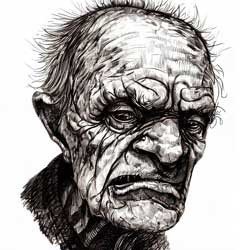 In the abundant and convoluted corridors of literary discourse, the spectre of Howard Phillips Lovecraft looms large, a figure both revered and reviled. His tales of cosmic horror, teeming with eldritch abominations and the existential dread of the unknown, have left an indelible mark on the genre. Yet, the shadow of his virulent racism and xenophobia taints this legacy, a disquieting reminder of the prejudices that were all too common in his era.
In the abundant and convoluted corridors of literary discourse, the spectre of Howard Phillips Lovecraft looms large, a figure both revered and reviled. His tales of cosmic horror, teeming with eldritch abominations and the existential dread of the unknown, have left an indelible mark on the genre. Yet, the shadow of his virulent racism and xenophobia taints this legacy, a disquieting reminder of the prejudices that were all too common in his era.
The scholarly discourse surrounding Lovecraft's work is rife with contention. Robert H. Waugh's paper, "H.P. Lovecraft's Ethnographic Fiction: 'The Horror in Museum' and 'Winged Death'", delves into Lovecraft's use of ethnography, a tool he wielded to express his own fears and anxieties about race and ethnicity. His stories often bristle with racial and ethnic stereotypes, a testament to his own repugnant views.
David Barnett, in his news article "H.P. Lovecraft's Racism: The Monster in the Library", underscores the fact that Lovecraft's racism is not a secret. It is a defining characteristic of his work, a reflection of his worldview that is as integral to his stories as his cosmic horrors. Lovecraft's racism is not just a personal flaw, but a part of his worldview that is reflected in his writings.
Wes House, in his comprehensive article on the Literary Hub titled "We Can’t Ignore H.P. Lovecraft’s White Supremacy", delves deep into Lovecraft's racist and xenophobic views. Lovecraft's letters overflow with anti-Semitic conspiracy theories and he expressed sympathies with rising fascism. His contempt for blacks is also evident in his writings. The article also discusses Lovecraft's short story, "The Horror at Red Hook," where his racist opinions are made most explicit. The story is filled with strong anti-immigration sentiments and gaudy displays of sympathy for racist policing.
The racism and xenophobia that permeate Lovecraft's works are deeply ingrained, reflected in his characters, plots, and the worlds he created. This aspect of Lovecraft's work is repugnant and cannot be ignored or excused. Yet, it is also a part of our literary history, a stark reminder of the prejudices that were prevalent in his time. It is important that we do not "ban, burn, or abolish" such works. Instead, we should use them as a tool for education, a means to learn from the mistakes of the past and strive for a more inclusive and understanding future.
The Vox article, "How HBO’s Lovecraft Country illuminates H.P. Lovecraft’s history of literary racism", provides further insight into Lovecraft's racism. It discusses how Lovecraft's racism is not just a product of his time, but a defining characteristic of his work. It also mentions that Lovecraft's racism is not just a personal flaw, but a part of his worldview that is reflected in his writings. The article also discusses Lovecraft's short story, "The Horror at Red Hook," where his racist opinions are made most explicit. The story is filled with strong anti-immigration sentiments and gaudy displays of sympathy for racist policing.
In conclusion, it is clear that Lovecraft's racism and xenophobia are not just personal flaws but are deeply ingrained in his works. His prejudiced views are reflected in his characters, plots, and the worlds he created. This aspect of Lovecraft's work is repugnant and cannot be ignored or excused. However, it is also a part of our literary history, a stark reminder of the prejudices that were prevalent in his time. It is important that we do not "ban, burn, or abolish" such works. Instead, we should use them as a tool for education and teaching, a means to learn from the mistakes of the past and strive for a more inclusive and understanding future. The nobility of literature is no safe haven for past cultural behavior, it can; however, cast sanitizing light upon that which we can ever aspire to better.
We find ourselves ensnared in the intricate web of Howard Phillips Lovecraft's literary legacy, a realm both shrouded in awe and repulsion. His tales, brimming with the dread of cosmic horrors and the unknown, have etched themselves into the annals of the genre. Yet, the spectre of his vehement racism and xenophobia casts a pall over this legacy, a stark reminder of the prejudices that once held sway.
References:
- Waugh, Robert H. "H.P. Lovecraft's Ethnographic Fiction: 'The Horror in Museum' and 'Winged Death'." Journal of the Fantastic in the Arts, Vol. 23, No. 3 (85) (2012), pp. 460-478.
- Barnett, David. "H.P. Lovecraft's Racism: The Monster in the Library." The Guardian, 2014.
- House, Wes. "We Can’t Ignore H.P. Lovecraft’s White Supremacy." Literary Hub, 2017.
- Rosenberg, Alyssa. 'How HBO’s Lovecraft Country illuminates H.P. Lovecraft’s history of literary racism.' Vox, 2023. https://www.vox.com/culture/21363945/hp-lovecraft-racism-examples-explained-what-is-lovecraftian-weird-fiction.






